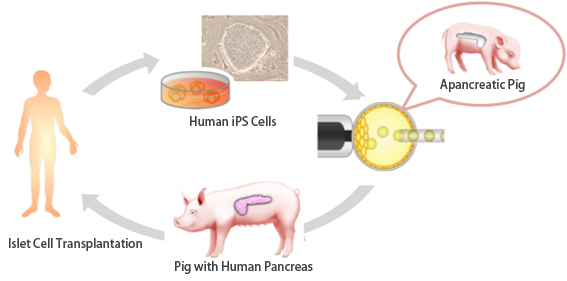Projects and Patents
ORGAN REGENERATION METHOD UTILIZING iPS CELL AND BLASTOCYST COMPLEMENTATION
| Application Field(s) | Regenerative Medicine, Animal Engineering, |
|---|---|
| FEATURES | In a blastocyst complementation method, it is found that the regeneration of an organ can be achieved by utilizing a fact that the defect in an organ such as pancreas can be complemented by injecting an induced pluripotent stem cell (an iPS cell) into a developed blastocyst. Disclosed is a method, in a living body of a non-human mammal having such an abnormality that a desired organ cannot be developed in the development stage, for producing an organ that is the same as the desired organ and is derived from a mammal different from the non-human mammal by using an iPS cell. |
| INTELLECTUAL PROPERTY STATUS | WO/2010/021390, PCT/JP2009/064676, JP 2010-525712, US20110258715, CN10296722, GB2475656 (issued), GB2490443 (issued), Principal Inventor: Prof. Hiromitsu Nakauchi |

Regenerating Human iPS cell-derived Pancreas
METHOD FOR PRODUCING FOUNDER ANIMAL FOR REPRODUCING ANIMAL HAVING LETHAL PHENOTYPE CAUSED BY GENE MODIFICATION
| Application Field(s) | Regenerative Medicine, Animal Engineering, |
|---|---|
| FEATURES | Disclose is a technique for constantly enabling organ regeneration in order to establish organ regeneration at improved efficiency. It is found out that, in the blastocyst complementation method, a next generation is born by injecting ES cells into the generated blastocysts to thereby complement a defect in an organ such as pancreas, kidney or the like. Further, it is found out that a transgenic animal in which the pancreas or kidney has been thus complemented can transmit the phenotype to the next generation as a founder. Thus, it is clarified that an organ can be regenerated by using such a founder. |
| INTELLECTUAL PROPERTY STATUS | WO/2009/104794, PCT/JP2009/053232 , JP 2009-554423, US20110067125, EP2258166, Principal Inventor: Prof. Hiromitsu Nakauchi |
METHOD FOR PRODUCING XENOGENEIC EMBRYONIC CHIMERIC ANIMAL USING STEM CELL
| Application Field(s) | Regenerative Medicine, Animal Engineering, |
|---|---|
| FEATURES | A xenogeneic chimeric animal can be produced by a method comprising the following steps (A) and (B): (A) injecting a stem cell into a blastocystic cavity in a blastocyst state of an animal heterogeneous to the stem cell, or mixing the stem cell with a fertilized ovum of an animal heterogeneous to the stem cell which has been divided, thereby producing a cell mass containing the stem cell; and (B) making the cell mass produced in step (A) grow into a chimeric animal of the species of an organism from which the stem cell is collected and the species of the animal heterogeneous to the stem cell. |
| INTELLECTUAL PROPERTY STATUS | WO/2008/087459, PCT/JP2010/051288, JP 2010-548574, US2011283374, Principal Inventor: Prof. Hiromitsu Nakauchi |
